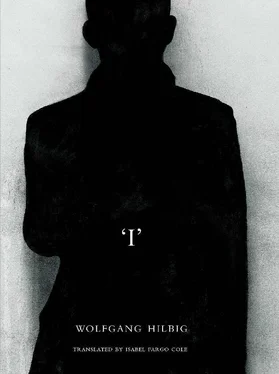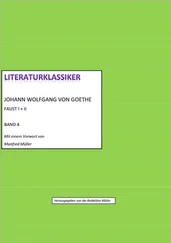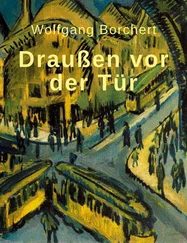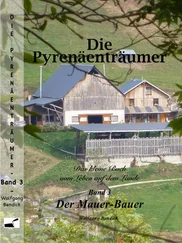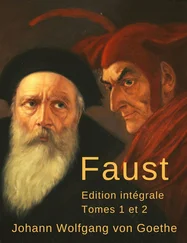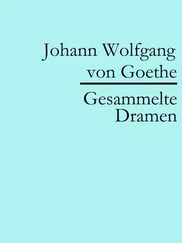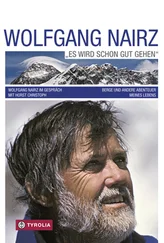In the kitchens of the Scene, where people planned and debated round the clock, he was viewed as the most taciturn one, never contributing anything to the controversies. . and perhaps he was the perpetually abstracted one, whose thoughts never dwelt in the same place as his person; but this very behaviour had garnered him the reputation of the imperturbable, reliable one, always on the spot. . and sometimes in several spots at once. — He was absolutely everywhere, he always put in at least one appearance wherever people were holding readings or theatre performances, wherever they were exhibiting paintings that hadn’t been reviewed by the authorities (abstract paintings?); his name was on every list (he just had to make sure it wasn’t the name Cambert !), his face blurred in the background of every commemorative snapshot, he was the Scene’s mute but never-tiring reinforcement, and sometimes he was the Scene all by himself. He was the eternal extra, then; his abiding spellbound attention emboldened the most inexperienced writer of prose or proclamations, and almost by habit all proposals and protests were given first to him to sign (he just had to watch out that he didn’t sign as ‘Cambert’). And when somewhere or other a van filled with detainees rolled off: he was there (he just couldn’t identify himself to the police as Cambert!); and waiting for the interrogation he, the staunch silent block amid the others’ flutter, was the first to catch the eye of the officer on duty, the first to be grabbed roughly by the lapel and dragged into the office (he just had to remind them not to throw him out with the words: Don’t come back any time soon, Herr Cambert!).
The most convenient role for him to play was the taciturn type. . Feuerbach carped about it, though: really he had nothing to offer (once W. had made this very threat to the boss in A., now Feuerbach repeated the words at every opportunity), every report had his name in it, but he never took any initiative. . How was he going to find out anything more than the usual if he didn’t take charge of the conversation himself? How was he ever going to penetrate to the heart of certain intimate connections if he couldn’t even make up his mind on a little flirt with the West Berliner ?
One day he had produced a profile of the person who bore his real name (a poet in the so-called unofficial literary scene , who, with others, had been the topic of conversation for nearly a year now). This job was a trial of patience; he’d had to provide a whole series of these descriptions, and after repeated, urgent requests from his superior he had completed the majority of them in the nights during and after a three-day workshop with the slogan Ecology and Perestroika , at which art was also shown and readings took place. As many participants as possible had to be recorded; identifying descriptions had to be supplied, along with brief summaries of their behaviour. On the list’s many pages, he himself occupied a place about a third of the way through:
Participant No. 29
(unquestionably the operationally known M. W.)
Gender: male; age: 44–8; height: 165–70 cm.; stature: stocky, corpulent; shape of head: round; carriage of head: generally tilted, but variable; complexion: pale (unshaven); forehead: broad, furrow over the nose; chin: receding, tendency to double chin; hair colour: dark blond, grey temples; haircut: medium length, ears covered; eye colour: grey; eyebrows: bushy, short, separate; clothing: light brown jacket, unlined (so-called parka, People’s Production), always worn open, faded blue riveted trousers (jeans, Lee brand), poor fit (too small in the waist), secured by black plastic belt, shirt (short-sleeved) with blue — green pattern; accessories: white plastic bag with the imprint RBI (Radio Berlin International), contents: 1 book (title and author not ascertained), 2 unopened packs of cigarettes (brand not ascertained).
Description in brief: No. 29 behaves as though he were not expected at the workshop. Shakes hands with approx. 10 persons. Displays little interest in the artwork on display, but when asked about it responds with exaggerated praise. Rarely takes part in discussions, rapidly switches interlocutor, exchanging trivial phrases such as: How’re you doing. Fine and you. I’m doing just fine and you. No I’m not doing bad and you. Me too. Yeah, since yesterday I’m doing fine and you. Also fine since yesterday and you. All the time his gaze remains restless, usually directed away from the interlocutor and roaming the garden. He seems interested only in the female attendees, but does not speak with them, only with the male attendees. Once he quotes a passage from Roland Barthes near a group of female attendees (incorrectly). Smokes heavily, cigarettes, Juwel brand (old), drinks beer from the bottle without always contributing to the collecting-box. Displays no initiative, gives the impression of a hanger-on.
Striking traits: scratches a spot on the back of his head to the right at least 50x over the course of the evening (endogenous eczema?). Bored, perspiring, complains about the heat (temperature around 19.00 only +16˚ C), one of the last to leave the event.
This was followed by the date 27 April of the year in question.
W. was glad to move out of the mirror, as he’d been forced — the broad mirror tilted out from the wall and captured the entire table — to endlessly identify himself among the other guests: the furrow over his nose, intersecting his brows and giving him a bifurcated gaze. The film of sweat on his brow, the hair which had grown over his ears and absorbed all the filth of the streets, gleaming greasily in the lamplight. . he decided to ask Frau Falbe tomorrow if he could use her bath.
As a matter of fact, he remembered the event, held in the spring (last spring?) on the grounds of a church in Berlin’s Rummelsburg district. Long after darkness fell, throngs of young people kept arriving to stroll about the church’s yard and gardens, children chasing one another in their midst; there were snack stands and tables where second-hand things were sold, the proceeds going to some good cause he’d forgotten; somewhere guitar music struck up, paper lanterns scattered coloured light. And outside the entrance several patrol cars had driven up in staggered formation; the loitering officers had long since abandoned the attempt to demand each new arrival’s identification. When W. had arrived in the afternoon things were different, even from a distance he’d seen the uniformed officers, stressed out by the exhaustive spot checks. . but with bored expressions they’d seemed about to let him pass. And he’d gone up to one of the policemen and provocatively whipped out his ID to the guy, who took it wearily and thumbed quickly through the pages. . You’re holding the ID upside down, Sergeant! W. said.
(C. took an S-Bahn train from Rummelsburg Depot to Ostkreuz, and one from there to Lichtenberg, where he changed for the U-Bahn to travel one stop in the direction of Alexanderplatz. In the dim underpass at Lichtenberg he already felt he was alone; from the platform he’d drifted slowly down the overlong, low, bare concrete shaft, past the long-distance rail platforms, all the way up front to the exit, avoiding the stairs in the middle, descending into the U-Bahn only at the front. There were only a few figures skulking about the underground platform: he was unlikely now to meet an acquaintance who might have seen him at the church in Rummelsburg. Now he took the U-Bahn to the next stop, at the Magdalenenstrasse Station he’d reached his destination; he took the eastern stairs — leading back in the direction of Lichtenberg — and up on Frankfurter Allee he went back the opposite way, heading for the cafe. — If Feuerbach had been sitting in his place by the window now, with his cheek to the glass, he would have seen him coming.
Читать дальше
